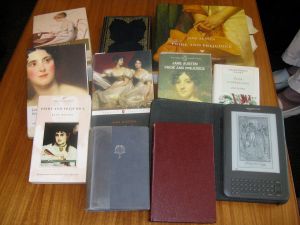In April, JASACT continued our slow reading of Pride and prejudice, by discussing, this month, Volume 2 (Chapters 24 to 42). This volume starts just after the Bingley retinue has moved to London, and includes Lydia’s going to Brighton and Elizabeth’s visit to Hunsford, where she receives Darcy’s proposal. It ends with her arrival in Derbyshire, in the company of her aunt and uncle, the Gardiners.
Discussion
Again, different members noticed different aspects on this umpteenth (for most of us) read of the novel. And again, this surprised us, though we should know by now that with Austen, this is not at all surprising.
One member, for example, found Jane, at the opening of the volume, just a bit too saccharine, and she quoted American academic Patricia Meyer Spacks from her annotated edition of the novel. Spacks likened the angelic Jane to the sentimental 18th century heroines, but notes that while they are good by exerting self-control, for Jane it comes from within her nature. Philosophers David Hume and Adam Smith argued that feeling rather than reason provides the grounding for morality, and Jane exemplifies this. She sympathises with everyone, and behaves graciously to all. Our member wondered whether she should temper her view of Jane!
It was also noted how many journeys there are in this volume:
- the Gardiners come to Longbourn
- Jane goes to London with the Gardiners
- Elizabeth goes to Hunsford/Rosings, via London, with the Lucases
- Darcy and Fitzwillaim go to Rosings, and then leave Rosings
- Darcy and Fitzwilliam leave Rosings
- Lydia goes to Brighton
- Elizabeth and the Gardiners set off for Derbyshire
These comings and goings, it was suggested, enable us to contrast Mrs Bennet and Lady Catherine de Burgh who are silly and illogical in different ways. These movements also provide opportunities for Elizabeth to reflect on events.
Because we know the outcome of the romance plot, re-reads often enable us to see exactly how the romance played out. One member felt this particularly on this read, saying she clearly saw Darcy’s growing interest in Elizabeth – his frequent visits to the parsonage, his delayed departure from Rosings, his enquiry of Elizabeth regarding her attachment to her country and home, and his frequently coming across her in the park. All this provides a subtle build up to the first proposal that is not necessarily noticed by a first-time reader.
We all commented on the quality and emotional power of his letter to Elizabeth after she rejects him, with one member adding that the proposal and subsequent letter provide the novel’s turning point. We learn of Darcy’s serious interest in her, while Elizabeth discovers that she had been unduly influenced by Wickham’s condemnation and feels shame as a result.
In fact, one member characterised this volume as being “the education of Elizabeth“. She starts prejudiced, sure of herself regarding Wickham and Darcy, and is prepared to give leeway to Wickham in the marriage stakes but not to Charlotte. But, she then sees how Charlotte has managed her life, and we see what poor company really her family were anyhow! Elizabeth learns that she had misjudged Mr Darcy, and recognises her own father’s failings. She castigates herself:
“How despicably I have acted!” she cried; “I, who have prided myself on my discernment! I, who have valued myself on my abilities! who have often disdained the generous candour of my sister, and gratified my vanity in useless or blameable mistrust! How humiliating is this discovery! Yet, how just a humiliation! Had I been in love, I could not have been more wretchedly blind! But vanity, not love, has been my folly. Pleased with the preference of one, and offended by the neglect of the other, on the very beginning of our acquaintance, I have courted prepossession and ignorance, and driven reason away, where either were concerned. Till this moment I never knew myself.”
Various members commented on Darcy’s cousin Fitzwilliam’s role in the novel’s plot and development. He passes on information to Elizabeth which enables her to glean some truths about Darcy’s true qualities, about his interest in her, but also about Darcy’s role in Bingley’s departure for London.
This volume also contains hints for the future. Should Elizabeth and Jane reveal Wickham’s true nature to others? What might the impact be of Mr Bennet’s inappropriate and neglectful behaviour as husband and father?
Our newest member was particularly intrigued by Mr Bennet, and asked what his purpose in the novel is. She described him as incompetent and wondered whether it was due to his being in an all-female environment. She’s seen it before, she said. We look forward to her observations on Mr Bennet when we discuss the final volume.
We discussed technique and style a little. One member commented on the changes in pace, while another asked whether Austen planned all the clues and hints to the plot, or did they happen seamlessly. (The age-old question for writers, we thought.) And, of course, there’s always some humour, provided mostly here by Mr Collins’ obsequiousness.
Overall, we agreed that this volume is the pivot for the novel. We learn a lot about the plot and the characters, relationships are developed, and we get hints of what’s to come.
Next month we move on to Volume 3, chapters 43 to 61.
Sources
Patricia Meyer Spacks, Note 9, p. 174, in Jane Austen, Pride & Prejudice: Annotated edition, Belknap Press, 2010.

Thank you for the excellent commentary. I missed the meeting so appreciate being able to read a summary of your discussion.
Oh thanks Sally. Lovely to have you comment! We were a small group for this one but had a good, if shorter than usual, discussion.